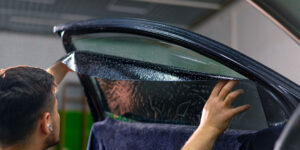Car protection films are a popular choice for car owners who want to protect their vehicles from scratches, dings, and other types of damage. These films are typically made from a clear, durable material that is applied to the exterior of the car. However, with so many different types of car protection films available on the market, it can be difficult to know which one is the best choice for your vehicle.
When choosing a car protection film, it is important to consider a variety of factors, including the quality of the film, the level of protection it provides, and the cost. Some films are designed specifically for certain types of vehicles or for specific areas of the car, such as the front bumper or the hood. Others are more universal and can be applied to any part of the car.
Additionally, it is important to consider the installation process when choosing a car protection film. Some films require professional installation, while others can be applied by the car owner themselves. It is also important to consider the durability of the film and how long it will last before needing to be replaced. By taking all of these factors into consideration, car owners can make an informed decision when choosing a car protection film that will provide the best level of protection for their vehicle.
Understanding Car Protection Films
Car protection films are an effective way to keep your car’s paint job looking new and protect it from scratches, chips, and other types of damage. These films are made of a clear polyurethane material that is applied to the exterior of your car. In this section, we will discuss the different types of car protection films and the benefits of using them.
Types of Car Protection Films
There are two main types of car protection films: paint protection film (PPF) and vinyl wrap. PPF is a clear film that is applied to the paint of your car, while vinyl wrap is a colored or printed film that is applied to the entire exterior of your car. PPF is more popular than vinyl wrap as it is specifically designed to protect the paint of your car from damage caused by rocks, debris, and other types of road hazards.
Benefits of Using Protection Films
Using car protection films has several benefits. Firstly, it helps to protect your car’s paint job from scratches, chips, and other types of damage. This can help to maintain the resale value of your car. Secondly, it reduces the need for frequent waxing and polishing, which can save you time and money. Thirdly, it can enhance the appearance of your car by giving it a sleek, glossy finish.
In addition, car protection films are durable and long-lasting, with some films lasting up to 10 years. They are also easy to maintain, requiring only regular washing with soap and water. Finally, car protection films are removable, which means that you can remove them without damaging the paint of your car if you decide to sell or trade-in your car.
In conclusion, car protection films are an excellent investment for car owners who want to keep their cars looking new and protect them from damage. By understanding the different types of car protection films and their benefits, you can make an informed decision about which film is right for your car.
Factors to Consider When Choosing
When selecting a car protection film, there are several factors that one should consider. These factors will help you to choose a film that is best suited for your needs. Here are some of the factors to consider:
Material Quality
The quality of the material used in making the film is crucial. High-quality films are made from materials that are resistant to scratches, chips, and other forms of damage. They are also less likely to fade or discolor over time. Look for films made from high-quality materials such as polyurethane or vinyl.
Thickness and Durability
The thickness of the film is another important factor to consider. Thicker films offer better protection against scratches and chips. They are also more durable and can last longer than thinner films. However, thicker films may be more expensive and may not be suitable for all types of vehicles.
UV Protection Level
The sun’s UV rays can cause damage to your car’s paint job over time. Look for films that offer a high level of UV protection. This will help to prevent fading and discoloration of your car’s paint.
Adhesive Strength
The adhesive strength of the film is another important factor to consider. A good film should have a strong adhesive that can withstand extreme weather conditions. It should also be easy to apply and remove without leaving any residue.
Finish and Aesthetics
The finish and aesthetics of the film are also important. Look for films that have a clear and glossy finish that enhances the appearance of your car. Some films also come in different colors and textures to match your car’s color and style.
In conclusion, when choosing a car protection film, it is important to consider the material quality, thickness and durability, UV protection level, adhesive strength, and finish and aesthetics. By considering these factors, you can choose a film that will provide the best protection for your car while enhancing its appearance.
Installation Process
Professional vs. DIY Installation
When it comes to installing car protection films, car owners have the option to either hire a professional or do it themselves. Hiring a professional installer can ensure that the film is applied correctly and evenly, reducing the risk of bubbles, wrinkles, or peeling. However, this option can be more expensive than doing it yourself. On the other hand, DIY installation can save car owners money, but it requires more time and effort to ensure a successful application.
Preparation and Tools Needed
Before starting the installation process, car owners should ensure that the car’s surface is clean and free of any dirt, debris, or wax. They should also have the necessary tools, such as a squeegee, a heat gun, and a razor blade, to ensure a smooth and even application. It is also recommended to have a spray bottle filled with a solution of water and soap to help the film adhere to the car’s surface.
Maintenance After Installation
After the car protection film is installed, car owners should avoid washing their car for at least 24 to 48 hours to allow the film to fully adhere to the surface. When washing the car, they should use a mild soap and avoid using abrasive materials or high-pressure washers. Additionally, car owners should avoid parking their car in direct sunlight for extended periods of time, as this can cause the film to fade or peel over time.
Overall, the installation process of car protection films can be a daunting task for car owners, but with the right preparation, tools, and maintenance, it can ensure that their car’s paint job remains protected for years to come.
Brand and Product Reviews
Comparing Top Brands
When it comes to choosing the right car protection film, it’s important to consider the brand. Some of the top brands in the market include 3M, XPEL, and SunTek. Each of these brands offers a range of products that differ in terms of quality and price.
3M is a well-known brand in the automotive industry and offers a variety of car protection films that are durable and long-lasting. XPEL is another popular brand that offers high-quality films with a self-healing technology that can repair minor scratches and swirl marks. SunTek is a relatively new brand but has quickly gained popularity among car enthusiasts for its affordable yet effective films.
Customer Testimonials
Reading customer reviews is a great way to get an idea of the effectiveness and durability of different car protection films. Many customers have reported positive experiences with 3M films, citing their longevity and effectiveness in protecting their car’s paint. XPEL films have also received high praise for their self-healing technology and ease of installation. SunTek films have received mixed reviews, with some customers reporting issues with peeling and bubbling.
Industry Ratings and Awards
Another way to compare different car protection films is to look at industry ratings and awards. The International Window Film Association (IWFA) provides ratings for different films based on their performance in various tests. Some of the top-rated films include 3M Scotchgard Pro Series, XPEL Ultimate, and SunTek CXP.
In addition, some brands have received awards for their innovative technology and high-quality films. For example, XPEL has received multiple awards for its self-healing technology, including the SEMA Global Media Award and the Popular Mechanics Editor’s Choice Award.
Overall, it’s important to do your research and compare different brands and products before choosing a car protection film. Consider factors such as durability, effectiveness, and price to find the right film for your needs.
Cost Considerations
Price Range
When it comes to car protection films, prices can vary greatly depending on the type of film and the brand. It is important to consider the price range of the films you are interested in and compare them to your budget. Generally, the cost of car protection films ranges from $200 to $1,500 per car.
The cost of the film will depend on various factors such as the size of the car, the type of film, and the brand. For instance, ceramic films are usually more expensive than other types of films due to their superior performance and durability.
Long-Term Value
While the initial cost of car protection films may seem high, it is important to consider the long-term value they provide. Investing in a high-quality film can save you money in the long run by protecting your car from damage and reducing the need for frequent repairs.
When choosing a car protection film, it is important to consider its durability and longevity. High-quality films can last for several years without fading or peeling, providing long-term protection for your car. In addition, some films come with warranties that cover any damage or defects, providing added value and peace of mind.
Overall, it is important to balance the cost of the film with its long-term value to ensure that you get the best protection for your car at a reasonable price.
Warranty and After-Sale Support
When choosing a car protection film, it is important to consider the warranty and after-sale support offered by the manufacturer. A good warranty can give you peace of mind and protect your investment in case of any defects or issues with the film.
Ideally, you should look for a manufacturer that offers a warranty of at least 5 years, although some high-quality films may come with a warranty of up to 10 years or more. Make sure to read the fine print of the warranty to understand what is covered and what is not.
In addition to the warranty, it is also important to consider the after-sale support offered by the manufacturer. This includes things like customer service, technical support, and repair services. A manufacturer with good after-sale support can help you address any issues or questions you may have about the film, and can provide you with the necessary support to ensure that your film stays in good condition.
To ensure that you get the best warranty and after-sale support, you should choose a reputable manufacturer with a proven track record of quality and customer satisfaction. Look for reviews and testimonials from other customers to get an idea of the level of support you can expect from the manufacturer.



